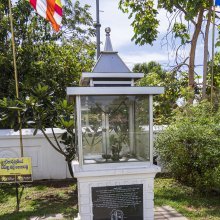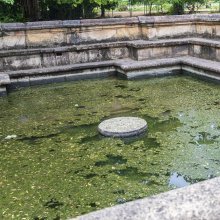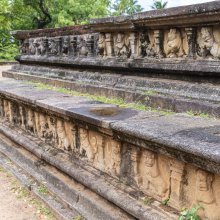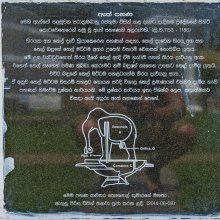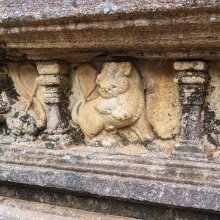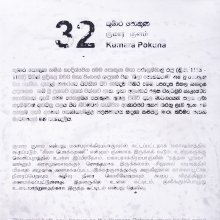Parakramabahu, Parākramabāhu: 2 definitions
Introduction:
Parakramabahu means something in Hinduism, Sanskrit, the history of ancient India. If you want to know the exact meaning, history, etymology or English translation of this term then check out the descriptions on this page. Add your comment or reference to a book if you want to contribute to this summary article.
Images (photo gallery)
(+30 more images available)
India history and geography
Source: academia.edu: The Chronological History of Ancient Sri Lanka1) The Kalyani inscriptions and the Polannaruwa inscription tell us that Siri Sanghabodhi Parakramabahu I was reigning in his 18th regnal year in the 1708th year of Buddha Varsha. Considering the epoch of Buddha Varsha in 1765 BCE, Parakramabahu I ascended the throne in the 1690th year of Buddha Varsha (75 BCE)
2) According to Attanagaluvamsa, Parakramabahu II ascended the throne in the 1824 of Buddha Varsha i.e. 59 CE. Pujavaliya tells us that Parakramabahu II reigned for 33 years. He repulsed two raids by Chandrabhanu, a Malaya and Java king. He had five sons, Vijayabahu, Bhuvanikabahu, Tilokamalla, Parakramabahu and Jayabahu. The eldest son Vijayabahu V succeeded him.
3) The Kelamya inscription records that Parakramabahu VI ascended the throne in the year 2051 of Buddha Varsha i.e. 286 CE.

The history of India traces the identification of countries, villages, towns and other regions of India, as well as mythology, zoology, royal dynasties, rulers, tribes, local festivities and traditions and regional languages. Ancient India enjoyed religious freedom and encourages the path of Dharma, a concept common to Buddhism, Hinduism, and Jainism.
Languages of India and abroad
Sanskrit dictionary
Source: Cologne Digital Sanskrit Dictionaries: Monier-Williams Sanskrit-English DictionaryParākramabāhu (पराक्रमबाहु):—[=parākrama-bāhu] [from parā-krama > parā-kram] m. Name of various kings in Ceylon, [Buddhist literature]
Sanskrit, also spelled संस्कृतम् (saṃskṛtam), is an ancient language of India commonly seen as the grandmother of the Indo-European language family (even English!). Closely allied with Prakrit and Pali, Sanskrit is more exhaustive in both grammar and terms and has the most extensive collection of literature in the world, greatly surpassing its sister-languages Greek and Latin.
See also (Relevant definitions)
Partial matches: Bahu, Parakrama.
Full-text: Samghabodhi, Dhammakitti, Gal Vihare, Bhuvanaikabahu, Yalpana, Kumaradasa, Polonnaruwa, Lanka.
Relevant text
Search found 8 books and stories containing Parakramabahu, Parākramabāhu, Parakrama-bahu, Parākrama-bāhu; (plurals include: Parakramabahus, Parākramabāhus, bahus, bāhus). You can also click to the full overview containing English textual excerpts. Below are direct links for the most relevant articles:
A Short history of Lanka (by Humphry William Codrington)
Chapter V - The Dambadeniya and Gampola Kings (1215 AD—1411 AD)
Chapter VI - The Kotte dynasty and its Portuguese allies (1412 AD—1550 AD)
Vastu-shastra (5): Temple Architecture (by D. N. Shukla)
Temple architecture in Ceylon (Sri Lanka) < [Chapter 12 - History of Hindu Temples (Prāsādas and Vimānas)]
Later Chola Temples (by S. R. Balasubrahmanyam)
Introduction < [Chapter IX - Rajadhiraja II (a.d. 1166 to 1182)]
Chapter VII - Rajaraja II (a.d. 1146 to 1172)
Appendix 1: Three Chieftains mentioned in inscriptions < [Chapter VIII - Temples of Rajaraja II’s Time]
Visuddhimagga (the pah of purification) (by Ñāṇamoli Bhikkhu)
Mahavamsa (by Wilhelm Geiger)
A Glimpse into Sinhalese Poetry < [May, 1928]
